Mental Health Illness Report: Munny's Case Study Analysis - 401013
VerifiedAdded on 2022/12/01
|9
|2508
|52
Report
AI Summary
This report analyzes a case study of a patient named Munny, focusing on his mental health status and potential illness. It examines his symptoms, including changes in behavior, communication, and physical health, as well as his work-related stress and personal history. The report utilizes the Mental State Examination (MSE) to assess Munny's condition and explores contributing factors to his mental health issues, such as job stress, loss of his mother, and insufficient sleep. It references the Diagnostic and Statistical Manual of Mental Disorders (DSM-5) to understand diagnostic criteria. Furthermore, the report discusses the mental health recovery process, emphasizing the importance of patient empowerment, societal support, and hope. It highlights the role of self-management strategies and the need to address stigma associated with mental illness. The report concludes by emphasizing that recovery is a journey with ups and downs, requiring commitment from the patient, family, and healthcare professionals.
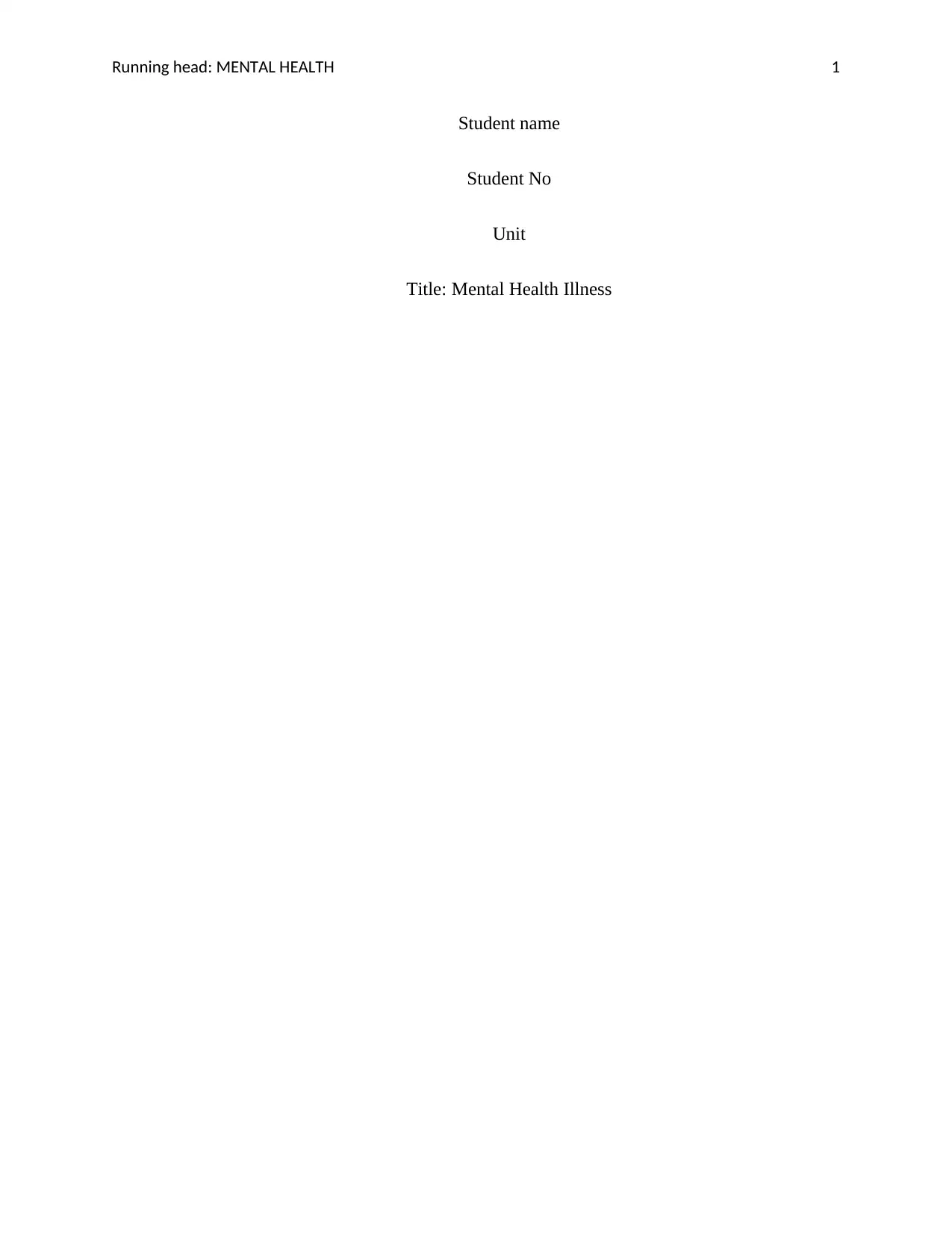
Running head: MENTAL HEALTH 1
Student name
Student No
Unit
Title: Mental Health Illness
Student name
Student No
Unit
Title: Mental Health Illness
Paraphrase This Document
Need a fresh take? Get an instant paraphrase of this document with our AI Paraphraser
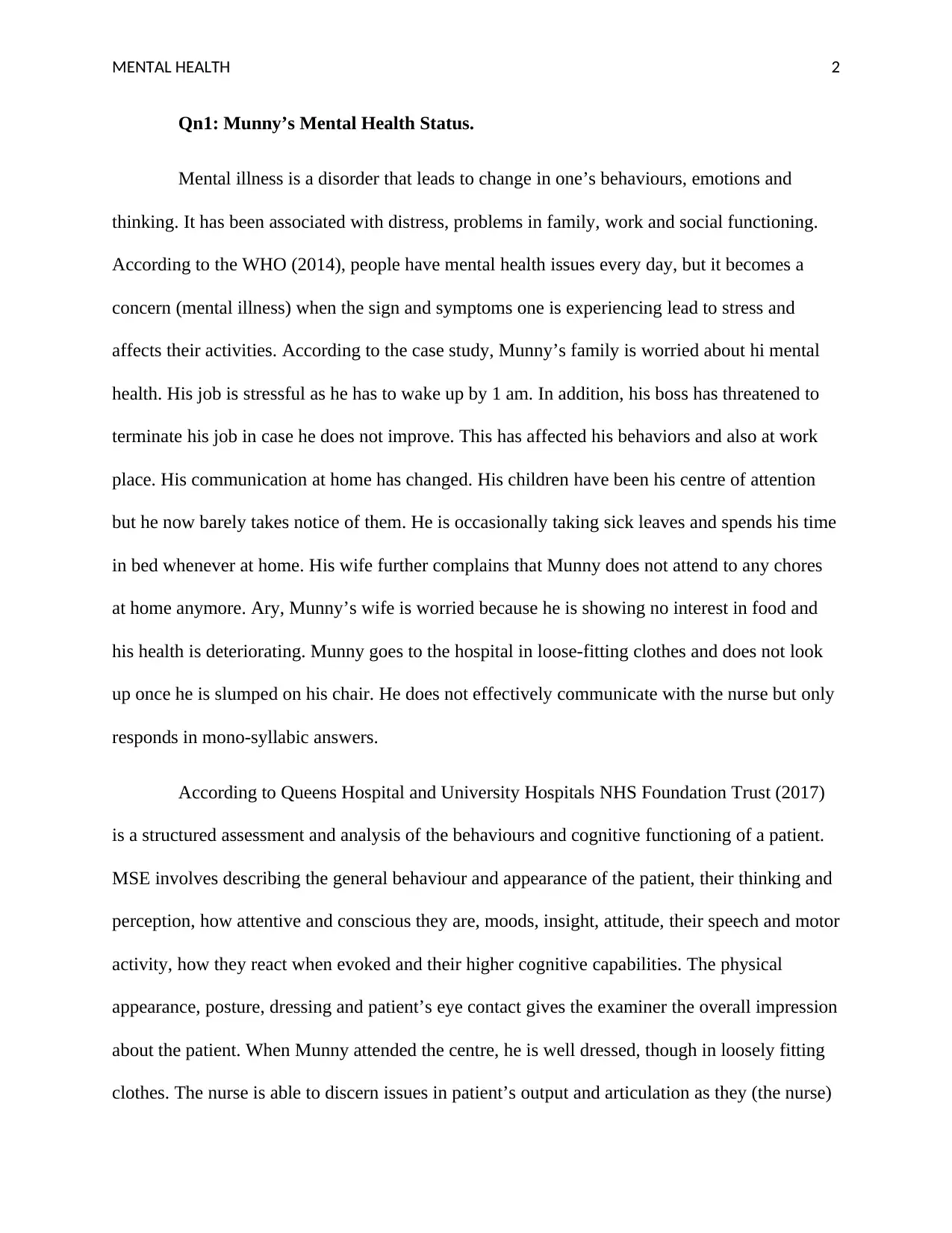
MENTAL HEALTH 2
Qn1: Munny’s Mental Health Status.
Mental illness is a disorder that leads to change in one’s behaviours, emotions and
thinking. It has been associated with distress, problems in family, work and social functioning.
According to the WHO (2014), people have mental health issues every day, but it becomes a
concern (mental illness) when the sign and symptoms one is experiencing lead to stress and
affects their activities. According to the case study, Munny’s family is worried about hi mental
health. His job is stressful as he has to wake up by 1 am. In addition, his boss has threatened to
terminate his job in case he does not improve. This has affected his behaviors and also at work
place. His communication at home has changed. His children have been his centre of attention
but he now barely takes notice of them. He is occasionally taking sick leaves and spends his time
in bed whenever at home. His wife further complains that Munny does not attend to any chores
at home anymore. Ary, Munny’s wife is worried because he is showing no interest in food and
his health is deteriorating. Munny goes to the hospital in loose-fitting clothes and does not look
up once he is slumped on his chair. He does not effectively communicate with the nurse but only
responds in mono-syllabic answers.
According to Queens Hospital and University Hospitals NHS Foundation Trust (2017)
is a structured assessment and analysis of the behaviours and cognitive functioning of a patient.
MSE involves describing the general behaviour and appearance of the patient, their thinking and
perception, how attentive and conscious they are, moods, insight, attitude, their speech and motor
activity, how they react when evoked and their higher cognitive capabilities. The physical
appearance, posture, dressing and patient’s eye contact gives the examiner the overall impression
about the patient. When Munny attended the centre, he is well dressed, though in loosely fitting
clothes. The nurse is able to discern issues in patient’s output and articulation as they (the nurse)
Qn1: Munny’s Mental Health Status.
Mental illness is a disorder that leads to change in one’s behaviours, emotions and
thinking. It has been associated with distress, problems in family, work and social functioning.
According to the WHO (2014), people have mental health issues every day, but it becomes a
concern (mental illness) when the sign and symptoms one is experiencing lead to stress and
affects their activities. According to the case study, Munny’s family is worried about hi mental
health. His job is stressful as he has to wake up by 1 am. In addition, his boss has threatened to
terminate his job in case he does not improve. This has affected his behaviors and also at work
place. His communication at home has changed. His children have been his centre of attention
but he now barely takes notice of them. He is occasionally taking sick leaves and spends his time
in bed whenever at home. His wife further complains that Munny does not attend to any chores
at home anymore. Ary, Munny’s wife is worried because he is showing no interest in food and
his health is deteriorating. Munny goes to the hospital in loose-fitting clothes and does not look
up once he is slumped on his chair. He does not effectively communicate with the nurse but only
responds in mono-syllabic answers.
According to Queens Hospital and University Hospitals NHS Foundation Trust (2017)
is a structured assessment and analysis of the behaviours and cognitive functioning of a patient.
MSE involves describing the general behaviour and appearance of the patient, their thinking and
perception, how attentive and conscious they are, moods, insight, attitude, their speech and motor
activity, how they react when evoked and their higher cognitive capabilities. The physical
appearance, posture, dressing and patient’s eye contact gives the examiner the overall impression
about the patient. When Munny attended the centre, he is well dressed, though in loosely fitting
clothes. The nurse is able to discern issues in patient’s output and articulation as they (the nurse)
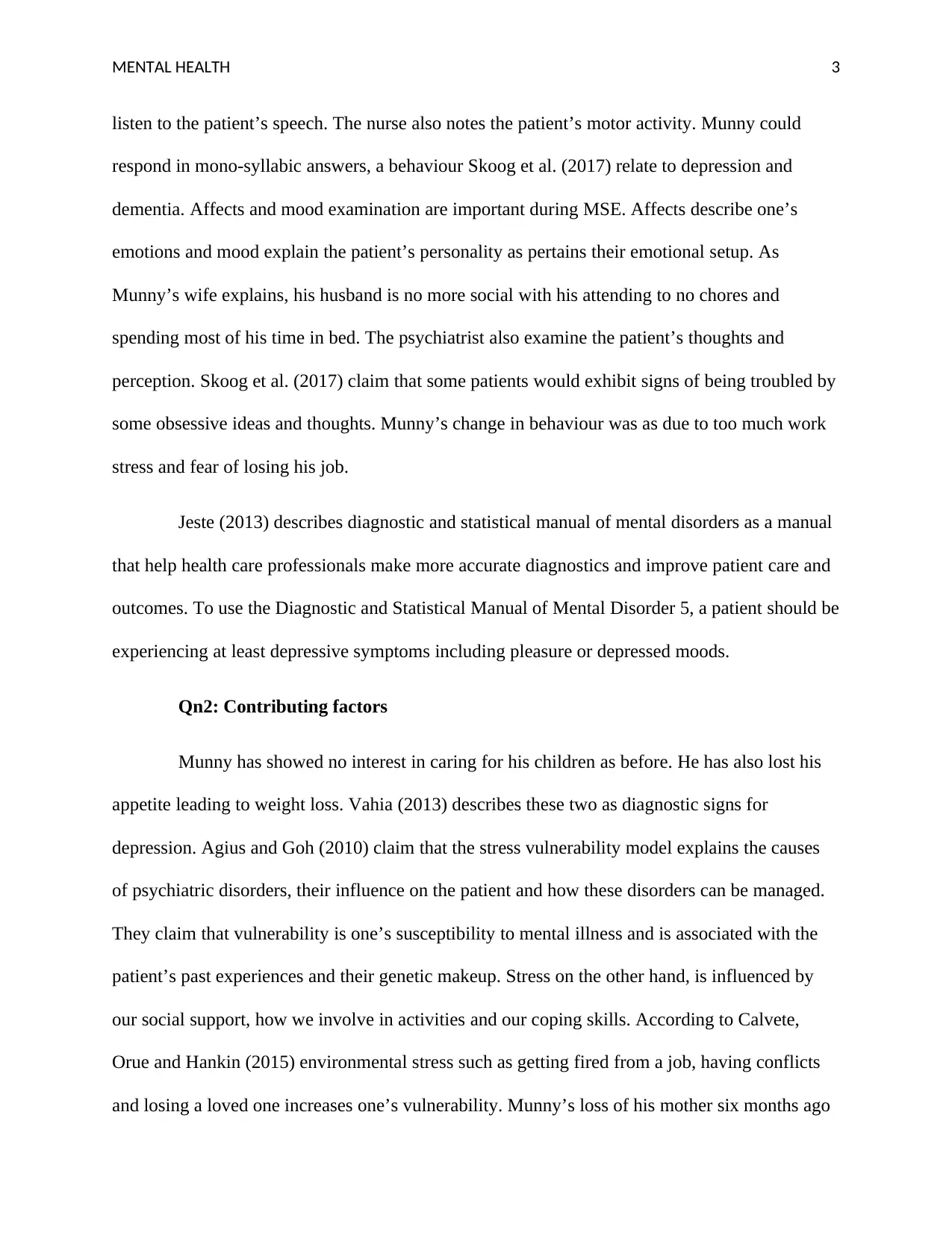
MENTAL HEALTH 3
listen to the patient’s speech. The nurse also notes the patient’s motor activity. Munny could
respond in mono-syllabic answers, a behaviour Skoog et al. (2017) relate to depression and
dementia. Affects and mood examination are important during MSE. Affects describe one’s
emotions and mood explain the patient’s personality as pertains their emotional setup. As
Munny’s wife explains, his husband is no more social with his attending to no chores and
spending most of his time in bed. The psychiatrist also examine the patient’s thoughts and
perception. Skoog et al. (2017) claim that some patients would exhibit signs of being troubled by
some obsessive ideas and thoughts. Munny’s change in behaviour was as due to too much work
stress and fear of losing his job.
Jeste (2013) describes diagnostic and statistical manual of mental disorders as a manual
that help health care professionals make more accurate diagnostics and improve patient care and
outcomes. To use the Diagnostic and Statistical Manual of Mental Disorder 5, a patient should be
experiencing at least depressive symptoms including pleasure or depressed moods.
Qn2: Contributing factors
Munny has showed no interest in caring for his children as before. He has also lost his
appetite leading to weight loss. Vahia (2013) describes these two as diagnostic signs for
depression. Agius and Goh (2010) claim that the stress vulnerability model explains the causes
of psychiatric disorders, their influence on the patient and how these disorders can be managed.
They claim that vulnerability is one’s susceptibility to mental illness and is associated with the
patient’s past experiences and their genetic makeup. Stress on the other hand, is influenced by
our social support, how we involve in activities and our coping skills. According to Calvete,
Orue and Hankin (2015) environmental stress such as getting fired from a job, having conflicts
and losing a loved one increases one’s vulnerability. Munny’s loss of his mother six months ago
listen to the patient’s speech. The nurse also notes the patient’s motor activity. Munny could
respond in mono-syllabic answers, a behaviour Skoog et al. (2017) relate to depression and
dementia. Affects and mood examination are important during MSE. Affects describe one’s
emotions and mood explain the patient’s personality as pertains their emotional setup. As
Munny’s wife explains, his husband is no more social with his attending to no chores and
spending most of his time in bed. The psychiatrist also examine the patient’s thoughts and
perception. Skoog et al. (2017) claim that some patients would exhibit signs of being troubled by
some obsessive ideas and thoughts. Munny’s change in behaviour was as due to too much work
stress and fear of losing his job.
Jeste (2013) describes diagnostic and statistical manual of mental disorders as a manual
that help health care professionals make more accurate diagnostics and improve patient care and
outcomes. To use the Diagnostic and Statistical Manual of Mental Disorder 5, a patient should be
experiencing at least depressive symptoms including pleasure or depressed moods.
Qn2: Contributing factors
Munny has showed no interest in caring for his children as before. He has also lost his
appetite leading to weight loss. Vahia (2013) describes these two as diagnostic signs for
depression. Agius and Goh (2010) claim that the stress vulnerability model explains the causes
of psychiatric disorders, their influence on the patient and how these disorders can be managed.
They claim that vulnerability is one’s susceptibility to mental illness and is associated with the
patient’s past experiences and their genetic makeup. Stress on the other hand, is influenced by
our social support, how we involve in activities and our coping skills. According to Calvete,
Orue and Hankin (2015) environmental stress such as getting fired from a job, having conflicts
and losing a loved one increases one’s vulnerability. Munny’s loss of his mother six months ago
⊘ This is a preview!⊘
Do you want full access?
Subscribe today to unlock all pages.

Trusted by 1+ million students worldwide
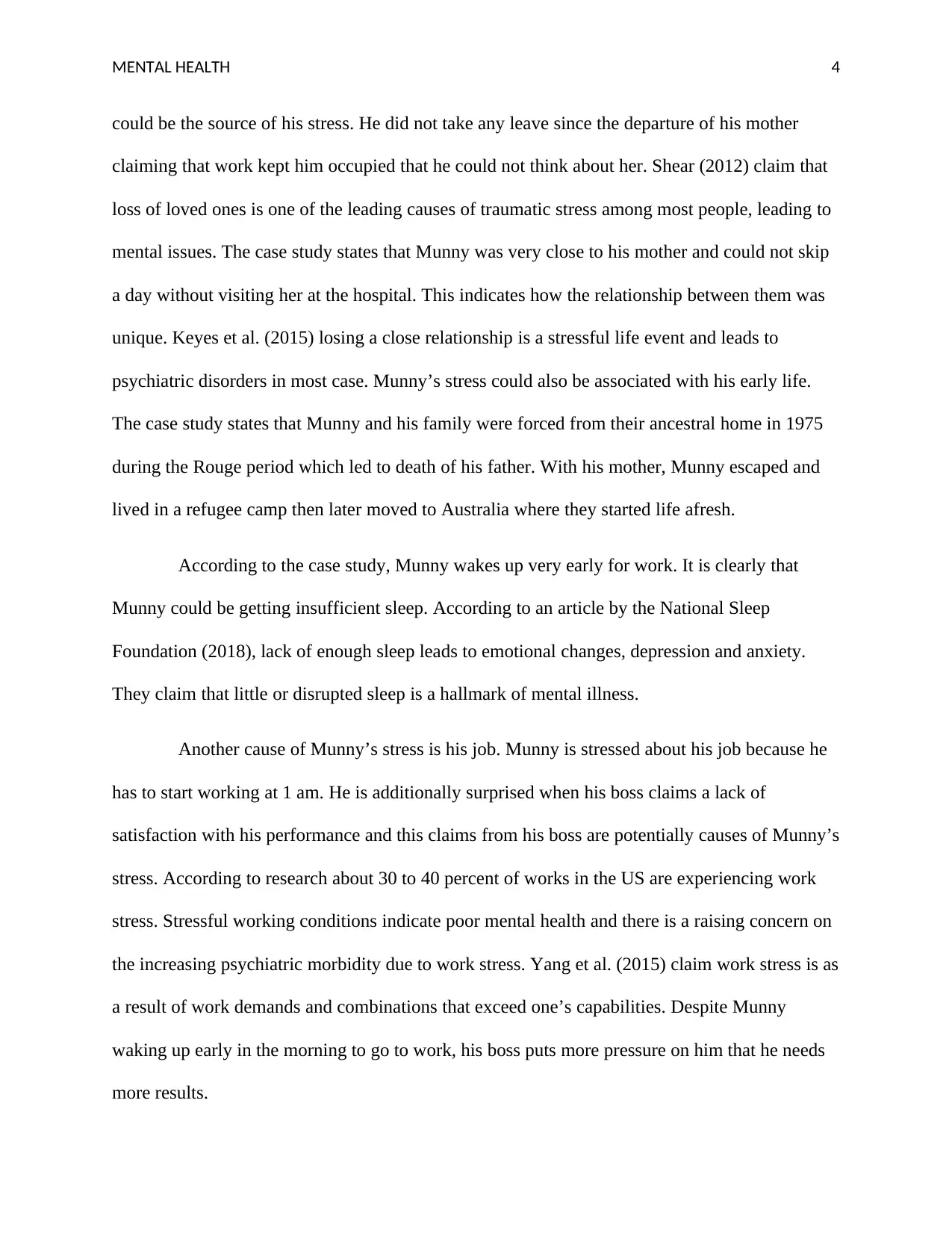
MENTAL HEALTH 4
could be the source of his stress. He did not take any leave since the departure of his mother
claiming that work kept him occupied that he could not think about her. Shear (2012) claim that
loss of loved ones is one of the leading causes of traumatic stress among most people, leading to
mental issues. The case study states that Munny was very close to his mother and could not skip
a day without visiting her at the hospital. This indicates how the relationship between them was
unique. Keyes et al. (2015) losing a close relationship is a stressful life event and leads to
psychiatric disorders in most case. Munny’s stress could also be associated with his early life.
The case study states that Munny and his family were forced from their ancestral home in 1975
during the Rouge period which led to death of his father. With his mother, Munny escaped and
lived in a refugee camp then later moved to Australia where they started life afresh.
According to the case study, Munny wakes up very early for work. It is clearly that
Munny could be getting insufficient sleep. According to an article by the National Sleep
Foundation (2018), lack of enough sleep leads to emotional changes, depression and anxiety.
They claim that little or disrupted sleep is a hallmark of mental illness.
Another cause of Munny’s stress is his job. Munny is stressed about his job because he
has to start working at 1 am. He is additionally surprised when his boss claims a lack of
satisfaction with his performance and this claims from his boss are potentially causes of Munny’s
stress. According to research about 30 to 40 percent of works in the US are experiencing work
stress. Stressful working conditions indicate poor mental health and there is a raising concern on
the increasing psychiatric morbidity due to work stress. Yang et al. (2015) claim work stress is as
a result of work demands and combinations that exceed one’s capabilities. Despite Munny
waking up early in the morning to go to work, his boss puts more pressure on him that he needs
more results.
could be the source of his stress. He did not take any leave since the departure of his mother
claiming that work kept him occupied that he could not think about her. Shear (2012) claim that
loss of loved ones is one of the leading causes of traumatic stress among most people, leading to
mental issues. The case study states that Munny was very close to his mother and could not skip
a day without visiting her at the hospital. This indicates how the relationship between them was
unique. Keyes et al. (2015) losing a close relationship is a stressful life event and leads to
psychiatric disorders in most case. Munny’s stress could also be associated with his early life.
The case study states that Munny and his family were forced from their ancestral home in 1975
during the Rouge period which led to death of his father. With his mother, Munny escaped and
lived in a refugee camp then later moved to Australia where they started life afresh.
According to the case study, Munny wakes up very early for work. It is clearly that
Munny could be getting insufficient sleep. According to an article by the National Sleep
Foundation (2018), lack of enough sleep leads to emotional changes, depression and anxiety.
They claim that little or disrupted sleep is a hallmark of mental illness.
Another cause of Munny’s stress is his job. Munny is stressed about his job because he
has to start working at 1 am. He is additionally surprised when his boss claims a lack of
satisfaction with his performance and this claims from his boss are potentially causes of Munny’s
stress. According to research about 30 to 40 percent of works in the US are experiencing work
stress. Stressful working conditions indicate poor mental health and there is a raising concern on
the increasing psychiatric morbidity due to work stress. Yang et al. (2015) claim work stress is as
a result of work demands and combinations that exceed one’s capabilities. Despite Munny
waking up early in the morning to go to work, his boss puts more pressure on him that he needs
more results.
Paraphrase This Document
Need a fresh take? Get an instant paraphrase of this document with our AI Paraphraser
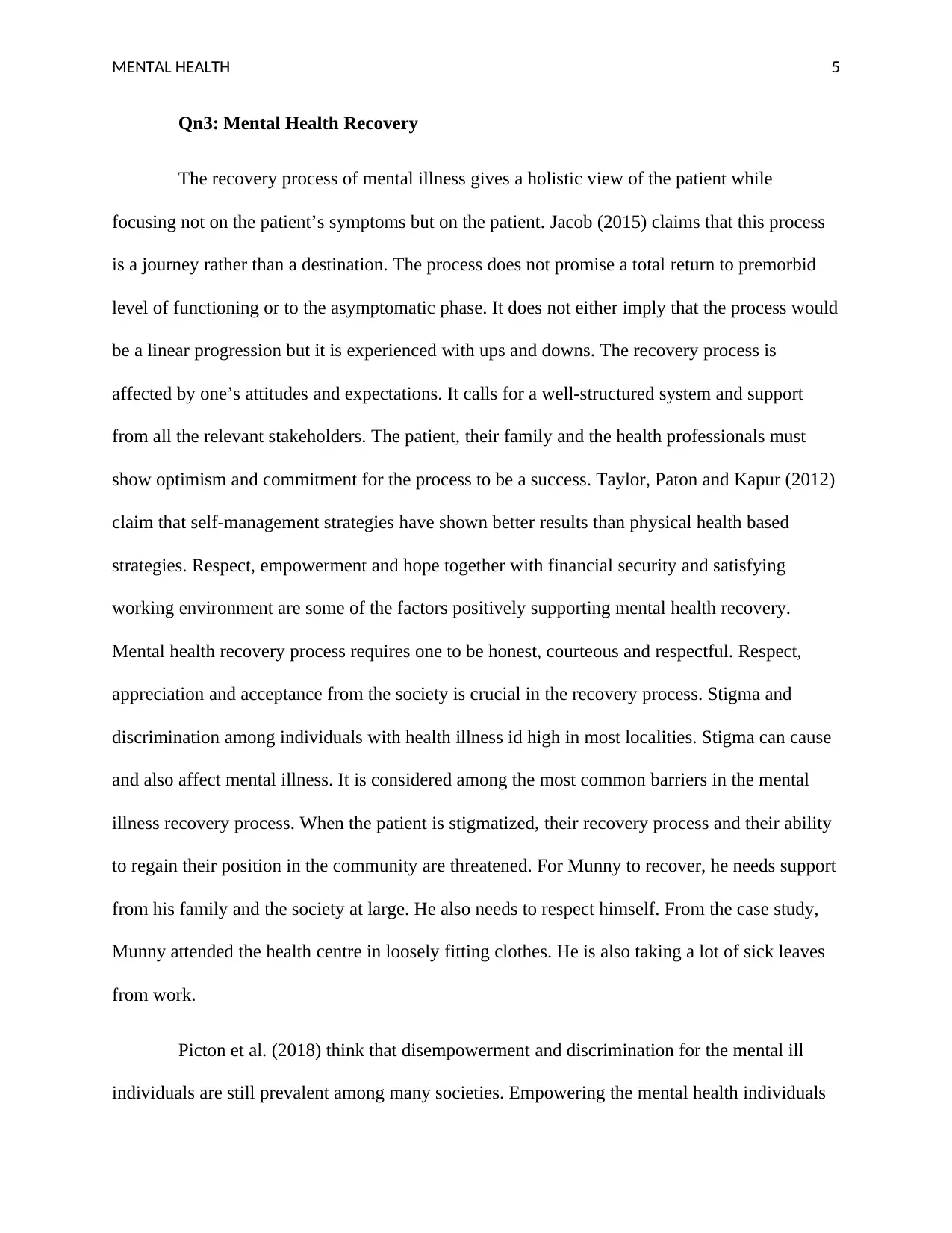
MENTAL HEALTH 5
Qn3: Mental Health Recovery
The recovery process of mental illness gives a holistic view of the patient while
focusing not on the patient’s symptoms but on the patient. Jacob (2015) claims that this process
is a journey rather than a destination. The process does not promise a total return to premorbid
level of functioning or to the asymptomatic phase. It does not either imply that the process would
be a linear progression but it is experienced with ups and downs. The recovery process is
affected by one’s attitudes and expectations. It calls for a well-structured system and support
from all the relevant stakeholders. The patient, their family and the health professionals must
show optimism and commitment for the process to be a success. Taylor, Paton and Kapur (2012)
claim that self-management strategies have shown better results than physical health based
strategies. Respect, empowerment and hope together with financial security and satisfying
working environment are some of the factors positively supporting mental health recovery.
Mental health recovery process requires one to be honest, courteous and respectful. Respect,
appreciation and acceptance from the society is crucial in the recovery process. Stigma and
discrimination among individuals with health illness id high in most localities. Stigma can cause
and also affect mental illness. It is considered among the most common barriers in the mental
illness recovery process. When the patient is stigmatized, their recovery process and their ability
to regain their position in the community are threatened. For Munny to recover, he needs support
from his family and the society at large. He also needs to respect himself. From the case study,
Munny attended the health centre in loosely fitting clothes. He is also taking a lot of sick leaves
from work.
Picton et al. (2018) think that disempowerment and discrimination for the mental ill
individuals are still prevalent among many societies. Empowering the mental health individuals
Qn3: Mental Health Recovery
The recovery process of mental illness gives a holistic view of the patient while
focusing not on the patient’s symptoms but on the patient. Jacob (2015) claims that this process
is a journey rather than a destination. The process does not promise a total return to premorbid
level of functioning or to the asymptomatic phase. It does not either imply that the process would
be a linear progression but it is experienced with ups and downs. The recovery process is
affected by one’s attitudes and expectations. It calls for a well-structured system and support
from all the relevant stakeholders. The patient, their family and the health professionals must
show optimism and commitment for the process to be a success. Taylor, Paton and Kapur (2012)
claim that self-management strategies have shown better results than physical health based
strategies. Respect, empowerment and hope together with financial security and satisfying
working environment are some of the factors positively supporting mental health recovery.
Mental health recovery process requires one to be honest, courteous and respectful. Respect,
appreciation and acceptance from the society is crucial in the recovery process. Stigma and
discrimination among individuals with health illness id high in most localities. Stigma can cause
and also affect mental illness. It is considered among the most common barriers in the mental
illness recovery process. When the patient is stigmatized, their recovery process and their ability
to regain their position in the community are threatened. For Munny to recover, he needs support
from his family and the society at large. He also needs to respect himself. From the case study,
Munny attended the health centre in loosely fitting clothes. He is also taking a lot of sick leaves
from work.
Picton et al. (2018) think that disempowerment and discrimination for the mental ill
individuals are still prevalent among many societies. Empowering the mental health individuals
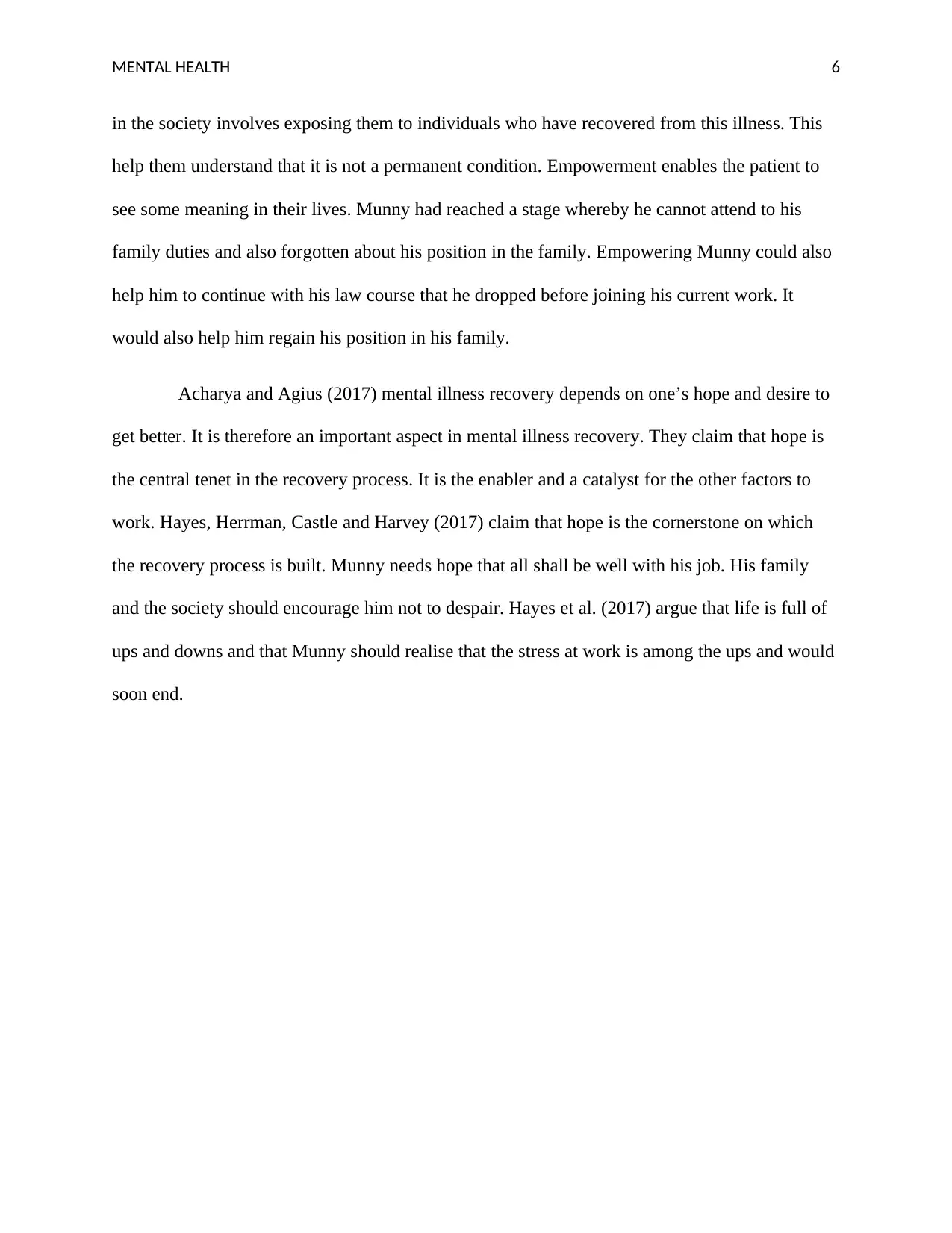
MENTAL HEALTH 6
in the society involves exposing them to individuals who have recovered from this illness. This
help them understand that it is not a permanent condition. Empowerment enables the patient to
see some meaning in their lives. Munny had reached a stage whereby he cannot attend to his
family duties and also forgotten about his position in the family. Empowering Munny could also
help him to continue with his law course that he dropped before joining his current work. It
would also help him regain his position in his family.
Acharya and Agius (2017) mental illness recovery depends on one’s hope and desire to
get better. It is therefore an important aspect in mental illness recovery. They claim that hope is
the central tenet in the recovery process. It is the enabler and a catalyst for the other factors to
work. Hayes, Herrman, Castle and Harvey (2017) claim that hope is the cornerstone on which
the recovery process is built. Munny needs hope that all shall be well with his job. His family
and the society should encourage him not to despair. Hayes et al. (2017) argue that life is full of
ups and downs and that Munny should realise that the stress at work is among the ups and would
soon end.
in the society involves exposing them to individuals who have recovered from this illness. This
help them understand that it is not a permanent condition. Empowerment enables the patient to
see some meaning in their lives. Munny had reached a stage whereby he cannot attend to his
family duties and also forgotten about his position in the family. Empowering Munny could also
help him to continue with his law course that he dropped before joining his current work. It
would also help him regain his position in his family.
Acharya and Agius (2017) mental illness recovery depends on one’s hope and desire to
get better. It is therefore an important aspect in mental illness recovery. They claim that hope is
the central tenet in the recovery process. It is the enabler and a catalyst for the other factors to
work. Hayes, Herrman, Castle and Harvey (2017) claim that hope is the cornerstone on which
the recovery process is built. Munny needs hope that all shall be well with his job. His family
and the society should encourage him not to despair. Hayes et al. (2017) argue that life is full of
ups and downs and that Munny should realise that the stress at work is among the ups and would
soon end.
⊘ This is a preview!⊘
Do you want full access?
Subscribe today to unlock all pages.

Trusted by 1+ million students worldwide
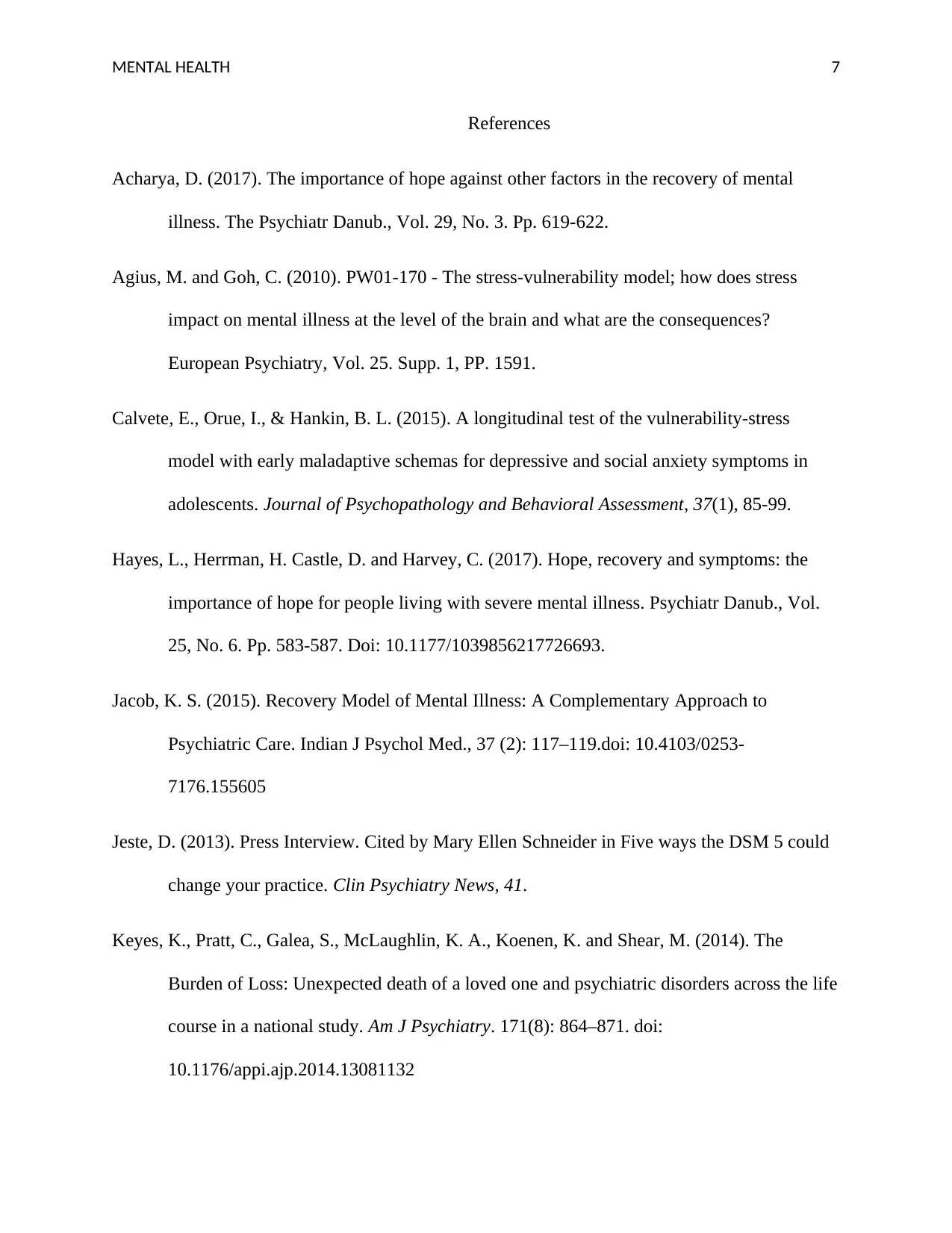
MENTAL HEALTH 7
References
Acharya, D. (2017). The importance of hope against other factors in the recovery of mental
illness. The Psychiatr Danub., Vol. 29, No. 3. Pp. 619-622.
Agius, M. and Goh, C. (2010). PW01-170 - The stress-vulnerability model; how does stress
impact on mental illness at the level of the brain and what are the consequences?
European Psychiatry, Vol. 25. Supp. 1, PP. 1591.
Calvete, E., Orue, I., & Hankin, B. L. (2015). A longitudinal test of the vulnerability-stress
model with early maladaptive schemas for depressive and social anxiety symptoms in
adolescents. Journal of Psychopathology and Behavioral Assessment, 37(1), 85-99.
Hayes, L., Herrman, H. Castle, D. and Harvey, C. (2017). Hope, recovery and symptoms: the
importance of hope for people living with severe mental illness. Psychiatr Danub., Vol.
25, No. 6. Pp. 583-587. Doi: 10.1177/1039856217726693.
Jacob, K. S. (2015). Recovery Model of Mental Illness: A Complementary Approach to
Psychiatric Care. Indian J Psychol Med., 37 (2): 117–119.doi: 10.4103/0253-
7176.155605
Jeste, D. (2013). Press Interview. Cited by Mary Ellen Schneider in Five ways the DSM 5 could
change your practice. Clin Psychiatry News, 41.
Keyes, K., Pratt, C., Galea, S., McLaughlin, K. A., Koenen, K. and Shear, M. (2014). The
Burden of Loss: Unexpected death of a loved one and psychiatric disorders across the life
course in a national study. Am J Psychiatry. 171(8): 864–871. doi:
10.1176/appi.ajp.2014.13081132
References
Acharya, D. (2017). The importance of hope against other factors in the recovery of mental
illness. The Psychiatr Danub., Vol. 29, No. 3. Pp. 619-622.
Agius, M. and Goh, C. (2010). PW01-170 - The stress-vulnerability model; how does stress
impact on mental illness at the level of the brain and what are the consequences?
European Psychiatry, Vol. 25. Supp. 1, PP. 1591.
Calvete, E., Orue, I., & Hankin, B. L. (2015). A longitudinal test of the vulnerability-stress
model with early maladaptive schemas for depressive and social anxiety symptoms in
adolescents. Journal of Psychopathology and Behavioral Assessment, 37(1), 85-99.
Hayes, L., Herrman, H. Castle, D. and Harvey, C. (2017). Hope, recovery and symptoms: the
importance of hope for people living with severe mental illness. Psychiatr Danub., Vol.
25, No. 6. Pp. 583-587. Doi: 10.1177/1039856217726693.
Jacob, K. S. (2015). Recovery Model of Mental Illness: A Complementary Approach to
Psychiatric Care. Indian J Psychol Med., 37 (2): 117–119.doi: 10.4103/0253-
7176.155605
Jeste, D. (2013). Press Interview. Cited by Mary Ellen Schneider in Five ways the DSM 5 could
change your practice. Clin Psychiatry News, 41.
Keyes, K., Pratt, C., Galea, S., McLaughlin, K. A., Koenen, K. and Shear, M. (2014). The
Burden of Loss: Unexpected death of a loved one and psychiatric disorders across the life
course in a national study. Am J Psychiatry. 171(8): 864–871. doi:
10.1176/appi.ajp.2014.13081132
Paraphrase This Document
Need a fresh take? Get an instant paraphrase of this document with our AI Paraphraser
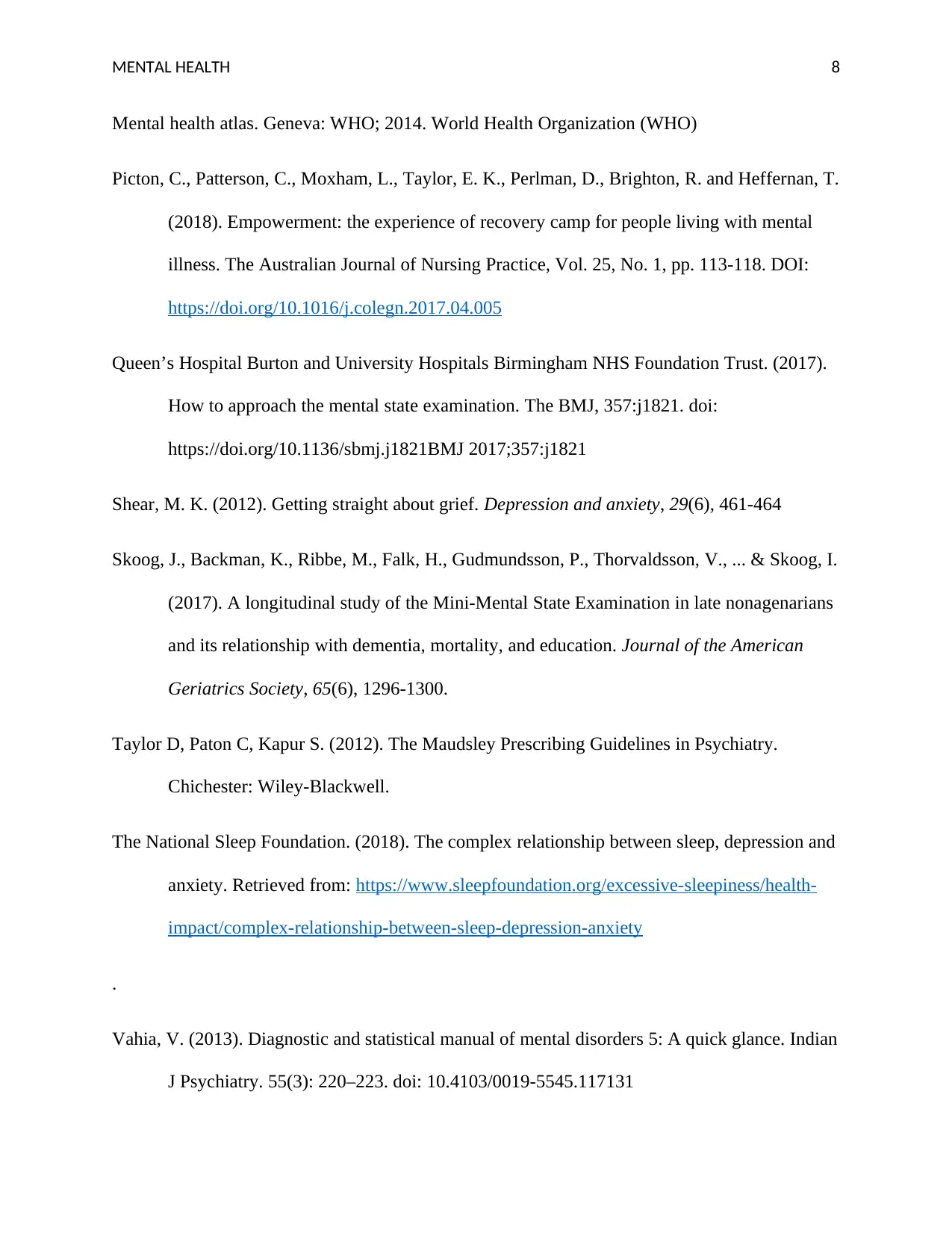
MENTAL HEALTH 8
Mental health atlas. Geneva: WHO; 2014. World Health Organization (WHO)
Picton, C., Patterson, C., Moxham, L., Taylor, E. K., Perlman, D., Brighton, R. and Heffernan, T.
(2018). Empowerment: the experience of recovery camp for people living with mental
illness. The Australian Journal of Nursing Practice, Vol. 25, No. 1, pp. 113-118. DOI:
https://doi.org/10.1016/j.colegn.2017.04.005
Queen’s Hospital Burton and University Hospitals Birmingham NHS Foundation Trust. (2017).
How to approach the mental state examination. The BMJ, 357:j1821. doi:
https://doi.org/10.1136/sbmj.j1821BMJ 2017;357:j1821
Shear, M. K. (2012). Getting straight about grief. Depression and anxiety, 29(6), 461-464
Skoog, J., Backman, K., Ribbe, M., Falk, H., Gudmundsson, P., Thorvaldsson, V., ... & Skoog, I.
(2017). A longitudinal study of the Mini‐Mental State Examination in late nonagenarians
and its relationship with dementia, mortality, and education. Journal of the American
Geriatrics Society, 65(6), 1296-1300.
Taylor D, Paton C, Kapur S. (2012). The Maudsley Prescribing Guidelines in Psychiatry.
Chichester: Wiley-Blackwell.
The National Sleep Foundation. (2018). The complex relationship between sleep, depression and
anxiety. Retrieved from: https://www.sleepfoundation.org/excessive-sleepiness/health-
impact/complex-relationship-between-sleep-depression-anxiety
.
Vahia, V. (2013). Diagnostic and statistical manual of mental disorders 5: A quick glance. Indian
J Psychiatry. 55(3): 220–223. doi: 10.4103/0019-5545.117131
Mental health atlas. Geneva: WHO; 2014. World Health Organization (WHO)
Picton, C., Patterson, C., Moxham, L., Taylor, E. K., Perlman, D., Brighton, R. and Heffernan, T.
(2018). Empowerment: the experience of recovery camp for people living with mental
illness. The Australian Journal of Nursing Practice, Vol. 25, No. 1, pp. 113-118. DOI:
https://doi.org/10.1016/j.colegn.2017.04.005
Queen’s Hospital Burton and University Hospitals Birmingham NHS Foundation Trust. (2017).
How to approach the mental state examination. The BMJ, 357:j1821. doi:
https://doi.org/10.1136/sbmj.j1821BMJ 2017;357:j1821
Shear, M. K. (2012). Getting straight about grief. Depression and anxiety, 29(6), 461-464
Skoog, J., Backman, K., Ribbe, M., Falk, H., Gudmundsson, P., Thorvaldsson, V., ... & Skoog, I.
(2017). A longitudinal study of the Mini‐Mental State Examination in late nonagenarians
and its relationship with dementia, mortality, and education. Journal of the American
Geriatrics Society, 65(6), 1296-1300.
Taylor D, Paton C, Kapur S. (2012). The Maudsley Prescribing Guidelines in Psychiatry.
Chichester: Wiley-Blackwell.
The National Sleep Foundation. (2018). The complex relationship between sleep, depression and
anxiety. Retrieved from: https://www.sleepfoundation.org/excessive-sleepiness/health-
impact/complex-relationship-between-sleep-depression-anxiety
.
Vahia, V. (2013). Diagnostic and statistical manual of mental disorders 5: A quick glance. Indian
J Psychiatry. 55(3): 220–223. doi: 10.4103/0019-5545.117131
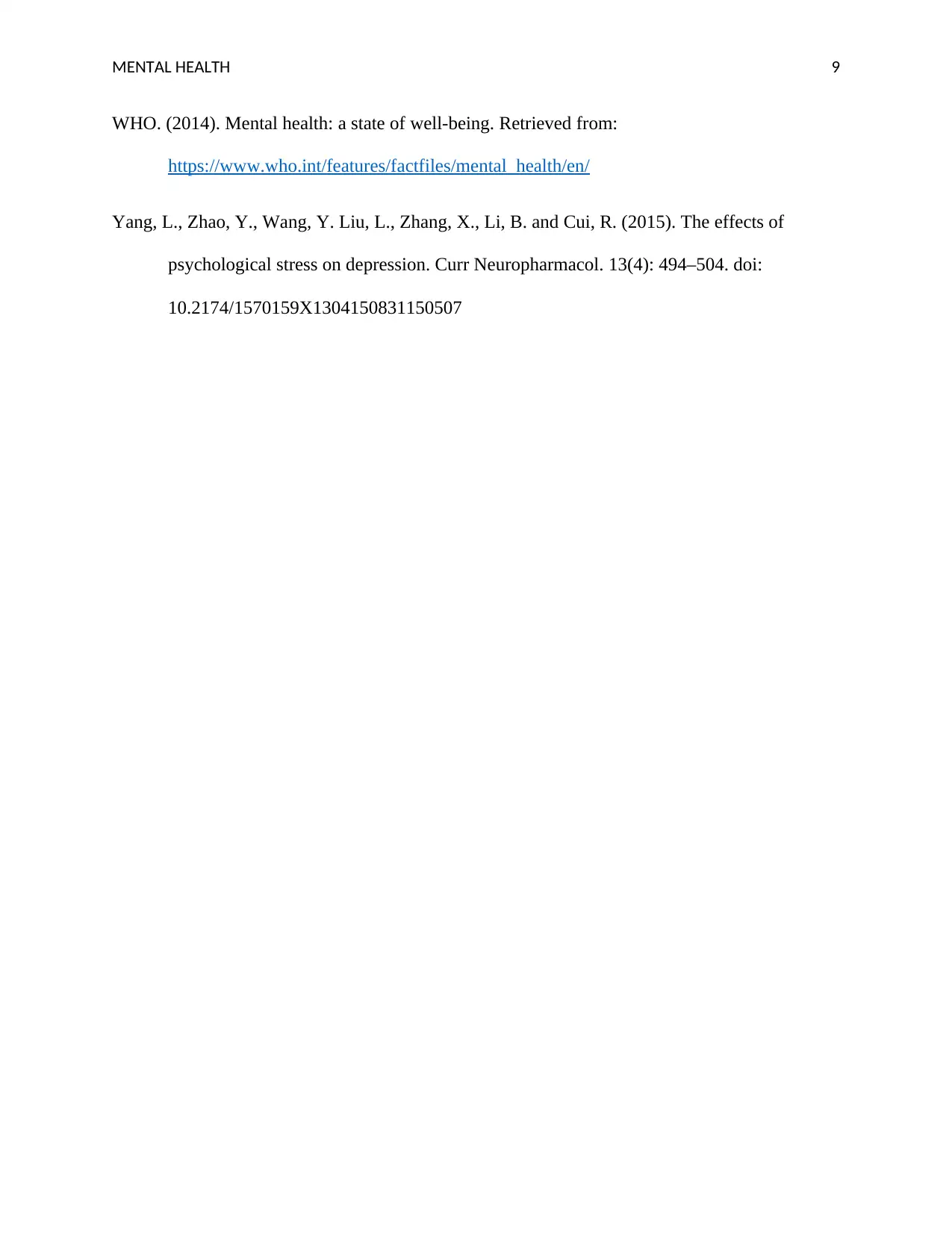
MENTAL HEALTH 9
WHO. (2014). Mental health: a state of well-being. Retrieved from:
https://www.who.int/features/factfiles/mental_health/en/
Yang, L., Zhao, Y., Wang, Y. Liu, L., Zhang, X., Li, B. and Cui, R. (2015). The effects of
psychological stress on depression. Curr Neuropharmacol. 13(4): 494–504. doi:
10.2174/1570159X1304150831150507
WHO. (2014). Mental health: a state of well-being. Retrieved from:
https://www.who.int/features/factfiles/mental_health/en/
Yang, L., Zhao, Y., Wang, Y. Liu, L., Zhang, X., Li, B. and Cui, R. (2015). The effects of
psychological stress on depression. Curr Neuropharmacol. 13(4): 494–504. doi:
10.2174/1570159X1304150831150507
⊘ This is a preview!⊘
Do you want full access?
Subscribe today to unlock all pages.

Trusted by 1+ million students worldwide
1 out of 9
Related Documents
Your All-in-One AI-Powered Toolkit for Academic Success.
+13062052269
info@desklib.com
Available 24*7 on WhatsApp / Email
![[object Object]](/_next/static/media/star-bottom.7253800d.svg)
Unlock your academic potential
Copyright © 2020–2026 A2Z Services. All Rights Reserved. Developed and managed by ZUCOL.





